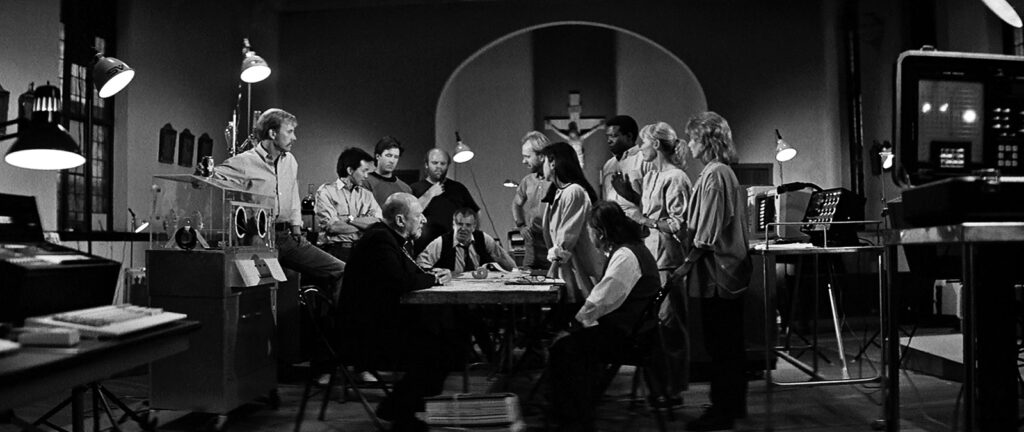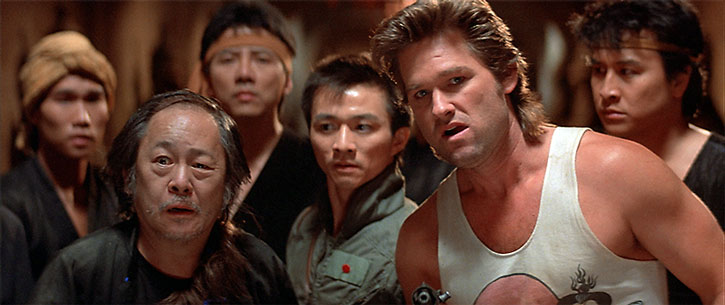I used the pandemic bank holiday to take in Big Trouble in Little China (86), a genre-splicing, freewheeling cult favourite, and the more unloved Prince of Darkness (87), a straight horror picture penned by John, with a Kurt shaped cavity where its heart should be.
Big trouble
Big Trouble, like many cult pictures (Buckaroo Banzai, say, whose Director re-wrote this script) gets better with more views, with a wonderful spirit of fun, where gun fights are A-Team bloodless, and martial arts are as much flying and lightning as kicks and fists.
It can be hard to keep track of what the hell is going on: there is a rescue, then an escape, then another, longer rescue and a final escape. There are fight scenes that go on forever, though they might well have merited their time if played on a big screen.
Generally though, it’s beautiful to look at, and all the blue lightning and flying kicks call to mind Double Dragon, and other Nintendo fare of the period. It’s very of-its-time, but freaky too, and possesses probably the warmest sense of humour of any Carpenter pic.
Kurt Russell gives one of this best performances: Jack Burton is brash, drawling, brave and utterly clueless. He’s constantly bettered by enemies, obstacles, even his own gun, but keeps blundering his way out of tight spots and thinking he’s doing tremendously well.
He has a few excellent lines, and defies expectations throughout. His character is the only thing holding the mess of events together, which go off like fireworks but prevent us focussing on the good actors around him, like James Hong, Victor Wong and Kim Cattrall.
Big crowd
Indeed, like other later John Carpenter efforts, they are just too many characters here. We don’t need both Uncle Chu and Egg Shen or both Margo and Gracie; we don’t need three henchmen groups in Thunder, Lightning and Rain, Eddie Lee, and the Monster; and having a second green-eyed bride saps the life from Miao Yin.
This overcrowding crops up again in Prince of Darkness, where the secret headquarters of the Brotherhood of Sleep is positively crammed with victims we’re given no time to begin to like. (Curious this flabbyness, from the man who brought us incredibly tight beseiged groups throughout his career).

There are things to like: the spooky future dream/transmission, the crucified pigeon, that gruesome end; they all lift what at times plays out like a more overtly supernatural Assault on Precinct 13, with a silent army laying siege, slaves to the Prince’s will – rather a shabby portrayal of homeless people in comparison of the excellent They Live, but still, Alice Cooper.
Besides, any movie where a lost gospel preaches the truth of Christ as extra-terrestrial must garner at least a few ‘oh, you went there?’ points.
Big mess
But the movie suffers terribly from the lack of a likable lead. Even mighty Carpenter regulars like Donald Pleasance and Victor Wong are suffocated by the sheer weight of idiotic students the script has to account for, consigning two charismatic greats to the fringes.
Jameson Parker is set up as the lead. But his character is an awful creep at the beginning, is granted absolutely no decent lines, and doesn’t get a chance to lead the action, forever bumping into other characters cluttering things up. In the end, Parker is nothing more than a memorable moustache.
Lisa Blount is the real hero in the end, which is a nice stroke, but again we’ve no real impression of a character. Dennis Dun, likeable in Big Trouble, is here the worst kind of irritating wise-cracker – certainly no Napoleon Wilson.
Big acting
Overcrowding is an issue for both films, but the sheer size of Russell’s performance guides us through Big Trouble‘s bloated, dizzy nonsense. Despite the multitude of characters, the film at least clearly has Kurt as its principle. Prince can’t decided who to focus on, which is more baffling.
How John didn’t commit to making a Wong or Pleasance film is rather mysterious. They are the informed leaders of the science team already, so why not make them leaders of the struggle? Failing that, why not provide Parker or Blount with some decent lines?
John certainly does great things with unknowns throughout his career, and is allowed his mis-steps. But in Prince there’s a perceptible sense of the cast struggling. How much better this would all be going, they seem to think, if Kurt would walk in that door and announce:
“Everybody relax. I’m here.”
